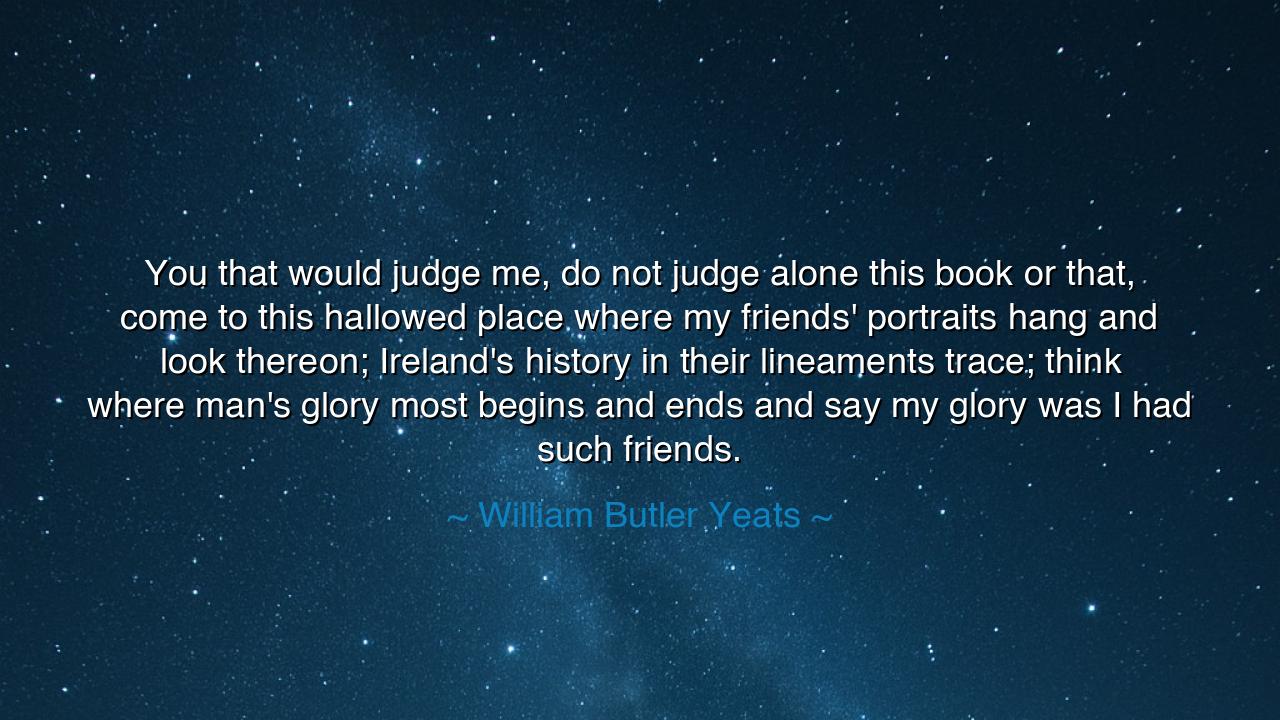
You that would judge me, do not judge alone this book or that
You that would judge me, do not judge alone this book or that, come to this hallowed place where my friends' portraits hang and look thereon; Ireland's history in their lineaments trace; think where man's glory most begins and ends and say my glory was I had such friends.






In the immortal words of William Butler Yeats, Ireland’s poet and prophet of the spirit, he wrote: “You that would judge me, do not judge alone this book or that, come to this hallowed place where my friends' portraits hang and look thereon; Ireland's history in their lineaments trace; think where man's glory most begins and ends and say my glory was I had such friends.” These lines, drawn from his poem The Municipal Gallery Revisited, were written when Yeats was no longer young — when his pen had grown tempered by time, and his heart by loss. They are words of remembrance, humility, and reverence, spoken not by a man exalting himself, but by one who bows before the memory of those who walked beside him. In them, Yeats teaches that the truest measure of a life is not fame, nor art, nor conquest, but fellowship — the noble bond of friendship and shared purpose.
When Yeats says, “do not judge alone this book or that,” he speaks to those who would weigh his worth by his poetry. He asks that they not look only to his written works — the symbols of intellect and ambition — but to the “hallowed place” where the portraits of his friends hang, immortalized in the Municipal Gallery of Dublin. There, he sees not merely faces, but the living history of his people — the poets, patriots, and dreamers who gave their blood and spirit to Ireland’s rebirth. For in their eyes, he reads the struggle and the triumph of a nation. Their lives were his inspiration; their friendship, his honor. Thus, he confesses that his greatest glory was not what he created, but whom he stood beside.
Yeats was a man of two passions — art and Ireland — and in this poem, the two intertwine. He recalls friends like Lady Gregory, John Synge, and Padraic Pearse, whose portraits adorned the gallery walls. These were not mere companions, but comrades in vision. They dreamed together of an Ireland free not only in body but in soul — an Ireland whose voice would rise again in poetry, theater, and song. Many of them suffered and died for that dream, and Yeats, in his later years, looked upon their faces with both pride and grief. “Ireland’s history in their lineaments trace,” he wrote — meaning that in their very features, one could see the destiny of the land itself. Their courage, their sorrow, their sacrifice were written not in books, but in their countenances, like sacred scripture etched upon the human face.
Thus, when Yeats asks the world to think “where man’s glory most begins and ends,” he offers a timeless truth: glory is not found in solitude or self-exaltation, but in connection. The artist, the warrior, the thinker — none stands alone. Every great achievement is born from a fellowship of kindred souls, each one a flame that keeps the other burning. The wise know that honor lies not in being greater than one’s friends, but in having friends worthy of greatness. Yeats’s glory, he insists, was not his art, but the company he kept — those whose lives made his own meaningful, and whose memory gave his work its depth.
Consider the story of Socrates in ancient Athens, surrounded by his disciples — Plato, Xenophon, and others who carried forth his thought after his death. Socrates left no writings of his own, yet his legacy endures because of those who loved him and bore witness to his truth. His glory, like Yeats’s, was his circle of friends, his communion of minds. In the same way, every human life, whether poet or peasant, finds its immortality not in monuments, but in the hearts that remember it. The friendships we forge, the souls we strengthen, these are the living works of art we leave behind.
Yeats’s words also remind us of the hallowed duty of remembrance — to honor not only our own achievements, but those of the companions who shaped us. In this modern age, where fame often overshadows friendship, his wisdom stands as a lantern in the dark. The measure of one’s greatness is not how high one climbs, but how deeply one loves and how faithfully one stands beside others in their striving. The truest artist, the truest patriot, the truest soul, is he who finds beauty in fellowship and strength in shared devotion.
So let this be the teaching drawn from Yeats’s heart: seek not only to make your mark upon the world, but to walk among those who lift the world with you. Cherish the faces that have shaped your path; honor the voices that have walked beside your own. When your days draw near their end, and others come to judge your life, may they see not only your works, but the company of your spirit — those who stood beside you in truth, in courage, in love. For as Yeats declared, “say my glory was I had such friends” — and so let it be said of all who live not for themselves, but for the fellowship that makes life sacred.






AAdministratorAdministrator
Welcome, honored guests. Please leave a comment, we will respond soon